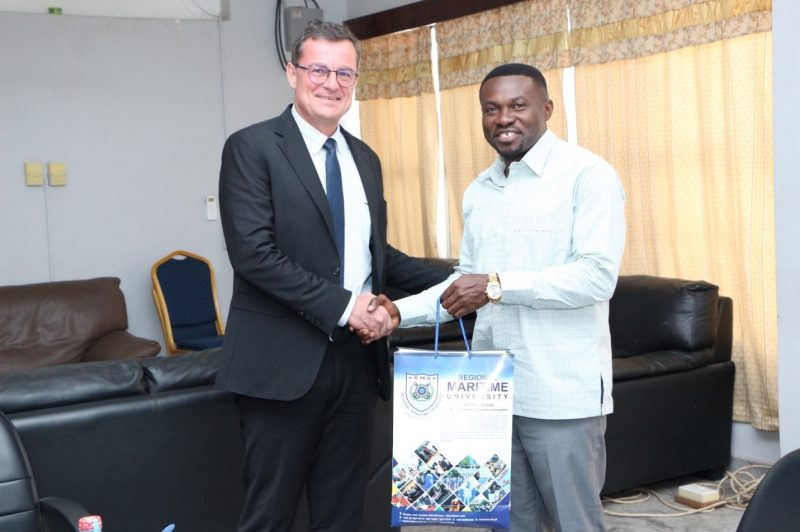

On Thursday, August 8, 2024, the Regional Maritime University (RMU) in Accra had the honor of hosting Mr. Arnaud Schweitzer, the European Union’s Detached National Expert in Counterterrorism and General Security for the Ivory Coast, Ghana, Togo, Benin, and Nigeria. The working visit was a significant step towards fostering collaboration in combating maritime crime and enhancing security in the Gulf of Guinea, a region crucial for maritime trade and economic development.
The discussions during the visit focused on collaborative efforts aimed at implementing maritime security projects that are vital to protecting the region from various forms of maritime crime, including piracy, illegal fishing, and other illicit activities. These challenges, if left unaddressed, could severely hamper the effective utilization of the maritime sector, which is pivotal to the economic growth of the region.
Dr. Denis Atehnijia, the Provost of RMU, warmly welcomed Mr. Schweitzer and provided an insightful overview of RMU’s growth and its ongoing projects dedicated to fighting maritime crime. He highlighted the university’s commitment to maritime security, noting the importance of fostering a culture of collaboration between nations to bolster efforts against these crimes. Dr. Atehnijia also introduced Mr. Schweitzer to the various departments within RMU, emphasizing that over 2,000 students are currently engaged in maritime security and related courses, preparing the next generation of professionals to tackle these pressing issues.
Dr. Denis Atehnijia, and Mr. Schweitzer.
In his remarks, Mr. Schweitzer expressed his appreciation for the opportunity to engage with RMU’s management. He underscored the critical importance of focusing on maritime security, noting that many countries have not yet fully addressed the security challenges posed by the waters. He called for pragmatic efforts to tackle these issues, including the reinforcement of laws governing maritime crime, with a particular focus on legislation, frameworks, and rules of engagement that would empower maritime security personnel to act effectively.
Mr. Schweitzer also reaffirmed the European Union’s commitment to working closely with institutions like RMU, as well as with governments in the region, to address the scourge of maritime crime. He stressed that collaboration is key to ensuring the safety and security of the region’s maritime domain.
During the meeting, Prof. Nana Ofosu-Boateng, the Dean of Maritime Studies at RMU, delivered a compelling presentation on the devastating effects of maritime crime on the region’s fisheries. He pointed out that illegal fishing activities, which are on the rise along the coast, have led to a significant decline in fish stocks, forcing Ghana to import a large portion of its fish. Prof. Ofosu-Boateng called for urgent government intervention to address the dwindling fish stocks and proposed the acquisition of modern surveillance equipment and state-of-the-art vessels to combat the increasingly sophisticated tactics of pirates.
Madam Sika Attipoe, The Head of the Business Development Center at RMU leading the delegation on a tour of RMU’s facilities.
The Head of the Business Development Center at RMU, Madam Sika Attipoe, also participated in the discussions, providing Mr. Schweitzer with an overview of the unit’s mandates and highlighting RMU’s capacity to host comprehensive maritime security programs. She emphasized that RMU is well-positioned to offer diverse prospects in maritime safety and related disciplines, inviting Mr. Schweitzer to tap into the university’s rich expertise. She added that the university is open for more diverse prospects in terms of maritime safety and other disciplines.
This visit marks a crucial step towards strengthening the partnership between the European Union and the Regional Maritime University in their shared mission to secure the Gulf of Guinea and ensure that the maritime sector continues to be a driver of economic growth and stability in the region.
Information Source: Marketing Unit.
